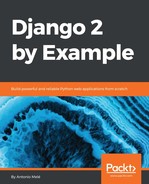Django provides several settings for internationalization. The following settings are the most relevant ones:
- USE_I18N: A Boolean that specifies whether Django's translation system is enabled. This is True by default.
- USE_L10N: A Boolean indicating whether localized formatting is enabled. When active, localized formats are used to represent dates and numbers. This is False by default.
- USE_TZ: A Boolean that specifies whether datetimes are time zone-aware. When you create a project with the startproject command, this is set to True.
- LANGUAGE_CODE: The default language code for the project. This is in standard language ID format, for example, 'en-us' for American English, or 'en-gb' for British English. This setting requires USE_I18N to be set to True in order to take effect. You can find a list of valid language IDs at http://www.i18nguy.com/unicode/language-identifiers.html.
- LANGUAGES: A tuple that contains available languages for the project. They come in two tuples of a language code and language name. You can see the list of available languages at django.conf.global_settings. When you choose which languages your site will be available in, you set LANGUAGES to a subset of that list.
- LOCALE_PATHS: A list of directories where Django looks for message files containing translations for this project.
- TIME_ZONE: A string that represents the time zone for the project. This is set to 'UTC' when you create a new project using the startproject command. You can set it to any other time zone, such as 'Europe/Madrid'.
These are some of the internationalization and localization settings available. You can find the full list at https://docs.djangoproject.com/en/2.0/ref/settings/#globalization-i18n-l10n.
